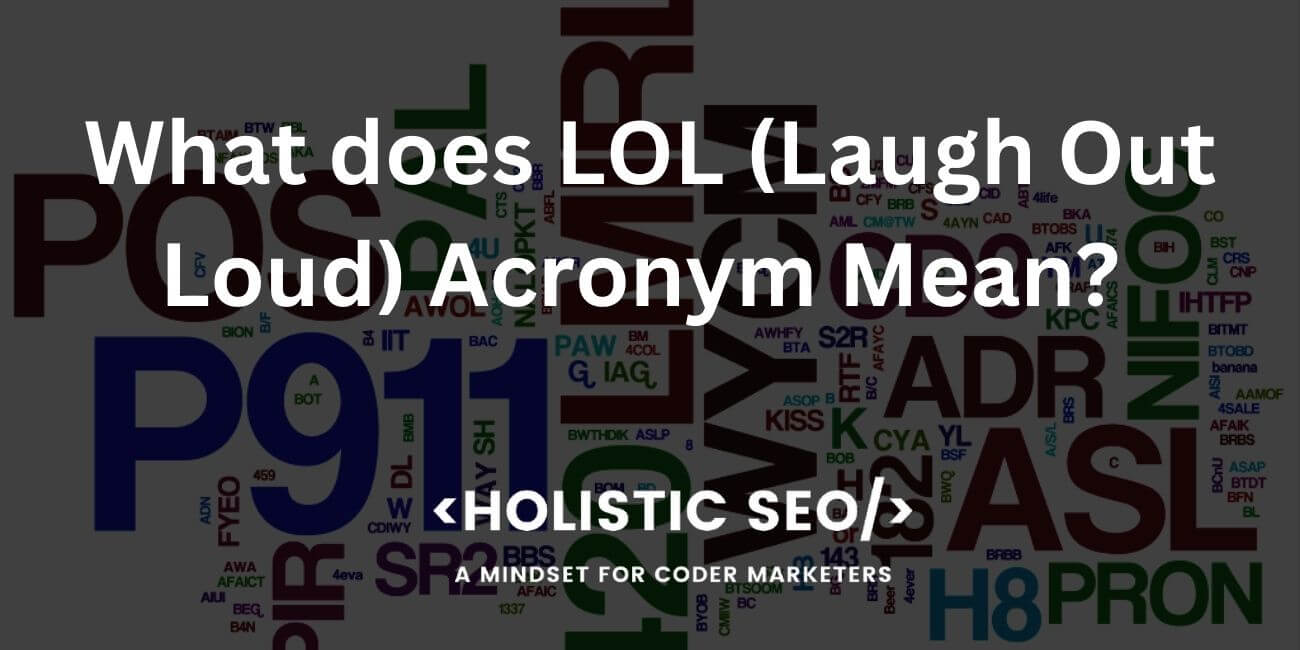“LUL” is an acronym for “Lame Uncomfortable Laugh.” The word expresses an uncomfortable laugh whenever there is an awkward situation, or someone has heard an unpleasant and lousy joke. “LUL” is used for people like friends, loved ones, or family members. “LUL” must be used when people feel uncomfortable with a joke or content, whether they are not funny and entertaining or just offensive. Meanwhile, LUL must not be used for academic papers, professional discussions, and SEO serious content when achieving formality. “LUL” impacts reliability and negatively affects the serious and formal context of the content. What does LUL text mean? The text “LUL” is an internet slang made to describe a lame, uncomfortable laugh in a shortened and convenient way. People on the internet, who encounter unpleasant content intended to be funny or a bad joke, usually indicate their emotions using the word LUL.
Many people engage on social media platforms as the internet grows. Thus, several mistakes and misinterpretations are always happening, such as “LUL” being used interchangeably with “LoL” despite having different spellings and meanings. What are the differences between “LoL” and “LUL” difference? The difference between “LUL” and “LoL” is that the first talks about having an uncomfortable laugh after hearing or reading an unpleasant joke or content. Meanwhile, the second one stands for “Laughing out Loud,” which is used to express a sudden burst of loud laughter that is not represented by a smile or simple laugh whenever a person encounters a funny joke or content. Additionally, there are “LUL” and “ROFL” differences as well. “While LUL” expresses discomfort, “ROFL” or “Rolling On The Floor Laughing” conveys a solid and intense laugh, even more, potent than “LoL.” The three words, namely “LUL,” “LoL,” and “ROFL,” are all part of a modern way of communication on the internet called internet slang. Internet slang is an unofficial language commonly used to communicate on the internet. It has no rules or proper structure; thus, it has no formality and must not be used for formal and serious papers and content. Internet slang is a common language used to create internet memes. An internet meme is a set of content that is usually abstract, humorous, inspiring, and enjoyable. An internet meme is spread on any social media platform through media such as photos, videos, or introductory text. Internet memes utilize internet slang to express their message to readers and viewers.
Who found LUL Abbreviation?
The abbreviation “LUL” or “Lame Uncomfortable Laugh” was created by John “TotalBuscuit” Bain in 2014. However, it is not entirely an abbreviation but rather an emote with the “LUL” acronym. “TotalBuscuit” was a popular live streamer on Twitch. LUL was conceptualized and made for Twitch, an interactive live-streaming platform on the internet. John made LUL express laughter and enjoyment inside the platform whenever John was streaming. Other users have used “LUL” on Twitch since then. It has become the most popular emote on the platform.
Do People use LUL for face-to-face Communication?
Yes, people utilize LUL for face-to-face communication. However, LUL is highly understandable and contextual if used in a textual and internet platform. Face-to-face communication is sharing information that at least two or more individuals are seeing each other and conversing through voice or speaking. Although LUL is a part of internet slang and originates in online communications, LUL is used in face-to-face communication. LUL and LoL are among the most used verbally spoken internet slang nowadays.
Is LUL only for textual communication?
No, “LUL” is not only for textual communication. Textual communication is a branch of communication where the information is read or viewed by its audience. It is commonly utilized on the internet, in newspapers, and in books. Even in face-to-face interactions, people communicate using internet slang, including “LUL.” Those internet slangs that are easily pronounced, such as “LUL,” “LoL,” and “LOLZ,” are the most used.
What do Internet Slang Experts think about LuL Abbreviation?
Internet slang experts consider internet slang abbreviations, including “LuL,” as helpful tools for advertising and SEO content writing. Internet slang, such as the “LuL” abbreviation, is stereotyped as meaningless and useless in providing information. Still, it turns out that it adds spice to the overall quality of the work. “Internet slang in advertising significantly increased audience attention compared with standard language but negatively affected brand and product evaluation when used excessively,” according to Liu et al., in their study entitled, Good Slang or Bad Slang? Embedding Internet Slang in Persuasive Advertising.” “LuL” is part of the internet slang, which indicates that the “LuL” abbreviation boosts the engagement of advertising and content writing if used appropriately. However, when an advertisement or content is filled with a lot of internet slang, such as “LuL,” it causes harm. “LuL” is allowed to be used in social media marketing and SEO content writing as it catches people’s attention. Disseminating information to the audiences and readers does not have to be formal and conventional. Thus, internet slang is recommended to increase relevance and interaction.
Is LUL a Pragmatic Particle?
No, LUL is not a pragmatic particle. Until now, despite the frequent usage of LUL all over the internet, it is still not accepted and recognized, which means that the word LUL is not being grammaticalized yet. There are no language experts that are focusing on LUL at the moment. Hence, the word’s slow development, acceptance, and recognition. Internet slang experts are much more focused on LOL as it is the most common among all internet slang.
When did Oxford English Dictionary accept the LUL Abbreviation?
Oxford English Dictionary has not yet accepted the “LUL” abbreviation since its introduction in 2013 and 2014. “LUL” is still not listed as one of Oxford’s formally recognized words, unlike other internet slang, such as “LOL,” which was accepted on March 24, 2011. The reason behind the situation is that “LUL” still has no actual definite meaning as of now, and it is less used compared to “LOL.” “LUL” is usually utilized as a substitution for LOL rather than a different word that describes another meaning. “LUL” as well is interpreted as “Love You Lots” in other countries, which causes another factor for misinterpretation and misuse, resulting in “LUL” having no universal meaning. Dictionaries do not accept words that have no fixed and precise meaning.
What is the oldest use of LuL on the internet?
The first and oldest recorded use of “LUL” on the internet was in June 2013, but it was used to express “Love You Lots” instead. The contextual usage of “LUL” to express laughter was in 2014 and was initially named Cynicallaugh. “LUL” was used by “TotalBuscuit” or John Bain on Twitch’s online streaming software platform. John used “LUL” to indicate intense laughter, which later became a popular expression on the forum.
What are the Variants of LUL?
LUL is just one of the thousand words under internet slang. The word LUL has a lot of similar words or variants that mostly only differ in spelling but have almost the same meaning and expression in the context of internet slang.
Listed below are the variants of LUL.
- LOL: LOL is the most popular word to describe laughter on the internet first used in the 1980s. LOL means “Laughing Out Loud” which indicates strong laughter without using a capitalized “hahahahaha”. LOL and LUL both express laughter but the first one describes pure laughter while the second one has a touch of discomfort.
- LULZ: LULZ is the plural form of LUL which means it expresses a lot of lame uncomfortable laughs. People use LULZ to describe their laughter at someone who got pranked. LULZ and LUL are the same in terms of aiming to express an unpleasant laugh, but they differ in the emphasis and number of laughs.
- LOLZ: LOLZ is the plural form of the word LOL which means a lot of laughs. LOLZ is utilized to describe a series of numerous strong laughs. LOLZ and LUL are expressing laughter but LOLZ is having a loud laugh while LUL is laughing in an uncomfortable manner.
- OMEGALUL: OMEGALUL is the bigger variant of LUL introduced in 2013 on Twitch. It is used by people on the internet to express a huge uncomfortable laugh to people they are talking to. OMEGALUL and LUL are the same in context, but the first one is used to describe a much stronger emotion.
- LULULUL: LULULUL is a word used by netizens to express a longer and more emphasized uncomfortable laughter. LULULUL is much stronger compared to LULZ. LULULUL and LUL have the same objective of expressing laughter but differ in duration and intensity.
What are the Derivations of LUL?
“LUL” is inspired and derived from the existing words on the internet such as LOL. People tend to create their own words out of the existing ones to make new meanings and expressions. “LUL” has different derivations currently present on the internet right now.
Listed below are the derivations of LUL.
- LOL: The concept of LUL is inspired due to the existence of LOL. The creator was able to formulate the LUL acronym because it was based on the shortened expression of laughter which is LOL.
- LUL: LUL originally means “Love You Lots” which was used in June 2013. However, the creator of LUL “Lame Uncomfortable Laugh” came up and created a new meaning for it.
The words in internet slang are mostly related to each other because some of them are just created from other existing words. Thus, the terms are just related to each other such as “LUL” and “LMAO.” They still have similarities in expressing laughter despite their differences in meaning.
Listed below are the related terms to LUL.
- LMAO: LMAO stands for “Laughing My Apples Off”, which is another word to express laughter in an intense way. LMAO was made during the early 1990s. Unlike LOL, LMAO does not give emphasis to loudness but to intensity instead. LMAO and LOL have the same objectives in terms of expressing laughter, but they do differ in emphasis and loudness.
- ROFL: ROFL is the abbreviation of “Rolling On the Floor Laughing”. It is a much stronger expression than LOL and LMAO. ROFL was created in 1989 on the Usenet platform. ROFL and LUL are both expressing laughter as well but ROFL does not have any hint of lameness or discomfort.
- *G*: *G* means grin which is an English word for smiling or laughing at something or someone. They have the same characteristics as LUL but *G* is used for jokes and content that are actually funny and entertaining.
- PMSL: PMSL is the abbreviation for “Pissing Myself Laughing” which originated in the year 2000. It is the most intense way of describing laughter. Just like other words that describe laughter, PMSL and LUL differ because the first one purely expresses laughter alone while the second one is experiencing lameness and discomfort while laughing.
What are the Foreign Equivalents of LUL from other Languages?
“LUL” or “Lame Uncomfortable Laugh” despite being internet slang, has its foreign equivalents. In today’s generation in which almost all countries have access to the internet, every race and nationality is already on the online platform. Thus, the different languages and expressions are welcomed and have foreign equivalents.
Listed below are the foreign equivalents of “LUL” from other languages.
- ㅋㅋㅋ: ㅋㅋㅋ is a Korean expression of “hahaha” which means unsatisfied laughter or awkward laughter being executed just to show respect to the person presenting a bad joke or not entertaining content.
- อิอิ: Thai people usually type อิอิ to express short laughter. However, it is used as well to describe a short laugh or a fake laugh just to respond to a joke or content that is not funny or laughable.
- 呵呵: 呵呵 is a Chinese equivalent for “hehe” which is used for sarcasm and embarrassment. The 呵呵 and LUL are both used for awkward and uncomfortable moments.
- Jaja: Jaja is read as “haha” in Spanish. It is used to express a short-term laugh that indicates lameness and an uncomfortable laugh.
How do Content Writers use LUL for communicating with Customers?
Content writers use LUL to express their embarrassment or discomfort whenever they tell bad jokes in their content. These bad jokes are not insulting but rather lack a laughable factor. What is a content writer? A content writer is a person who is tasked to write relevant and valuable articles that contain different kinds of information based on the topics and target audience. They do editing, planning, researching, and writing to produce content. Content writers publish their articles on digital platforms. The objective of including LUL in SEO content writing is to give more twists and fun to the entertaining topic being written. It is used as well to relay a message without having to write long sentences. However, it is important to note that content writers only use LUL when necessary. Content writers do not usually use LUL even if their content is funny and entertaining, as it affects the content’s capability to be understood easily. They prefer to describe the scenario in detail so that users and readers understand the content immediately.
Do Social Media Marketers use LUL?
Yes, social media marketers use LUL. Social media marketers are individuals who create valuable content to promote their products. The content is in text, photos, videos, or graphical form. Social media marketing, especially in the context of entertainment, uses LUL to pave the way for a more relevant and interactive manner. With the help of LUL, social media marketing is able to connect to various types of audiences better as the formality and convention are slightly lessened.
Meanwhile, LUL is used as well on other platforms such as Twitch. How to use LUL in Twitch? There are two ways of using LUL in Twitch, the first one is via typing, and the second one is by opening the remote box. The first way of using LUL is by directly typing the word LUL in the chat section, and as soon as the emote pops up, the user sends it immediately. On the other hand, the second way of using LUL is by purposely pressing the emote box and choosing the LUL to emote. After the LUL has been put into the chat section, it is ready to be sent.
Does LUL a not serious term for SEO Content?
Yes, LUL is not a serious term for SEO content. A not serious term is used to describe things that lack formality, and structure, and mostly aim to provide fun and entertainment. SEO content writing refers to the writing and publishing of content in a digital platform to disseminate information to a wide range of people across the globe. Although LUL is not a serious term for SEO content, it is allowed to be used for funny and entertaining content writing. Content writers must use LUL to describe briefly what they are trying to convey to the users and readers. However, they must as well be aware that excessive usage of LUL destroys their content’s E-A-T, relevance, and capacity to be understood.
What is the difference between LuL and LoL?
The difference between LuL and LOL is that the first refers to a laugh with discomfort, while the second indicates laughing loudly. LuL, or “Lame Uncomfortable Laugh,” is used when a person does not have a good impression of a joke or content that is supposed to be funny. LUL is used by people for sarcasm when they get offended or for respect when they do not want the other person to feel bad after sharing a lousy joke or content. On the other hand, LoL is used for laughing loudly and firmly. It is intended to let someone know how funny the mark or the content is. LoL is both for authenticity and sarcasm.
- 48 Online Shopping and Consumer Behavior Statistics, Facts and Trends - August 22, 2023
- B2B Marketing Statistics - August 22, 2023
- 38 Podcast Statistics, Facts, and Trends - August 22, 2023



Great explanation of the LUL emote acronym! It’s fascinating how internet culture has created a whole new language of expression. LUL perfectly captures that awkward, forced laughter we all know too well. Thanks for breaking it down so clearly!